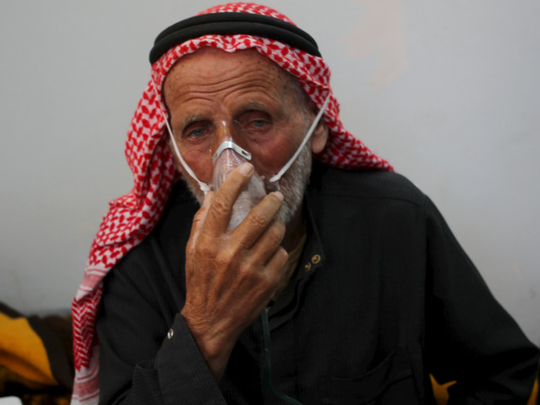
Beirut: Eyes watering, struggling to breathe, Abd Al Mouin, 22, dragged his nephews from a house reeking of noxious fumes, then briefly blacked out. Even fresh air, he recalled, was “burning my lungs.”
The chaos unfolded in the Syrian town of Sarmeen one night this spring, as walkie-talkies warned of helicopters flying from a nearby army base, a signal for residents to take cover. Soon, residents said, there were sounds of aircraft, a smell of bleach and gasping victims streaming to a clinic.
Two years after President Bashar Al Assad agreed to dismantle Syria’s chemical weapons stockpile, there is mounting evidence that his government is flouting international law to drop jerry-built chlorine bombs on rebel-held areas. Lately, the pace of the bombardments in contested areas like Idlib province has picked up, rescue workers say, as government forces have faced new threats from rebels.
The Al Assad government has so far evaded more formal scrutiny because of political, legal and technical obstacles to assigning blame for the attacks - a situation that feels surreal to many Syrians under the bombs, who say it is patently clear the government drops them.
“People are so used to it, they know from the sound,” said Hatem Abu Marwan, 29, a rescue worker with the White Helmets civil defense organization, a note of exasperation creeping into his voice when asked to explain. “We know the sound of a helicopter that goes to a low height and drops a barrel. Nobody has aircraft except the regime.”
Prodded by the United States, the UN Security Council is discussing a draft resolution that would create a panel, reporting to the secretary-general, to determine which of the warring parties is responsible for using chlorine as a weapon, according to Council diplomats.
“The Security Council must address the need to determine who is responsible for using chlorine as weapons in Syria,” said a US official, who declined to offer specifics and requested anonymity to discuss continuing negotiations. “Doing so is critical to getting justice for the Syrian people and accountability for those who have repeatedly used chemical weapons in Syria.”
Syrian state media dismiss the allegations as propaganda, and the council remains divided and hamstrung. That leaves people like Abu Marwan, who has responded to nine suspected chlorine attacks, feeling abandoned.
“There is no law to defend us as human beings, this is what we understand from the Security Council,” said Abu Marwan, a law school graduate, weeping as he recalled holding a dying child in Sarmeen. “I didn’t see in humanitarian law anything that says ‘except for Syrians.’”
In contrast to stronger toxins like nerve agents and mustard gas, chlorine is lethal only in highly concentrated doses and where medical treatment is not immediately available, making it more an instrument of terror than of mass slaughter. It is typically dropped in barrel bombs containing canisters that explode on impact, distributing clouds of gas over civilian populations, and is distinguishable by its characteristic odor.
So it falls under a kind of loophole. With many civilian uses, like purifying water or disinfecting hospitals, it is not banned under international law and thus was not on the list of chemicals Al Assad promised to destroy - though using chlorine as a weapon is forbidden.
The Security Council did condemn the use of chlorine as a weapon in Syria, in February. But with Russia, the Syrian government’s most powerful ally, wielding a veto, there was no Council agreement to assign blame.
The Organization for the Prohibition of Chemical Weapons, which monitors agreements on toxic arms, found that chlorine had been used “systematically and repeatedly” in three Syrian villages in 2014, and mentioned witness accounts of helicopter-borne chlorine bombs in its report. But it, too, lacked authorization to say who used them.
Alistair Hay, a toxicologist at the University of Leeds who has trained Syrians to collect environmental samples, called the attacks a “slap in the face” to the international chemical weapons convention that Syria had joined less than a year earlier. Syria signed under a Russian-American deal to avoid US military strikes after sarin, a nerve agent, killed more than 1,000 people in rebel-held areas near Damascus.
Frustrated with the Security Council’s impasse over the issue, rescue workers and doctors are now working to bring evidence of chlorine gas attacks directly to the French, British and US governments for testing. The aim is to give states a solid basis for action against the attacks, in the Security Council or through quieter diplomatic pressure, said James Le Mesurier, the British director of a nonprofit group, Mayday Rescue, which trains and equips the White Helmets, Syrian volunteers supported by the British, Danish and Dutch governments.
But investigators face difficulties. Chlorine dissipates quickly in the atmosphere and does not last in blood or urine, and residue stays in soil for just 48 hours, leaving little time to transport samples across borders. Also, Le Mesurier said, the Organization for Prohibition of Chemical Weapons differentiates evidence they collect themselves from evidence collected by rescue workers, categorizing the latter as circumstantial.
Three other Syrian doctors said the organization’s rules resulted in valuable evidence they collected going unexamined.
One, who protects his identity with the nickname “Chemical Hazem” for his safety, said he reached one of the April 2014 attack sites, Tal Minnes, within hours, smelling bleach in the air. He smuggled samples from two victims to Turkey without waiting for border clearances. But he said the OPCW refused to accept an unexploded canister, which remains in Syria.
“The ultimate evidence of the regime’s use of chemical weapons is gone,” he said, adding that no one seemed interested in getting samples out of Syria. “We can’t blame anyone who wants to follow the legal channels - but do any exist?”












